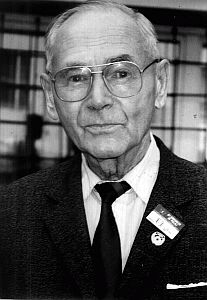Joachim Giessner
Joachim Giessner (born December 23, 1913 in Dresden ; † November 25, 2003 in Trippstadt near Kaiserslautern ) was a railroad worker in the upper non-technical service. He became known worldwide beyond the borders of Germany for his work in and for Esperanto .
Job and family
Gießner's professional career began in May 1933 as a trainee Reichsbahn inspector in the Dresden district . Its first place of work was the border crossing station Franzensbad ( Františkovy Lázně , 1936 to 1938). He then worked for the Reichsbahn in Dresden and the surrounding area. During the Second World War he did railroad service in France and Poland . After the war, he worked in what was then senior management west in Bielefeld . From 1954 he was deputy head of department at Braunschweig main station , from 1960 head of department in Elze (Han) and from 1966 to 1978 station master in Herzberg am Harz .
Gießner married on June 11, 1938 in Dresden. After 34 years as citizens of Herzberg, the couple moved to a retirement home in the Palatinate Forest in 2002 , where Joachim Gießner died a year later.
Esperanto activity
Joachim Gießner came into contact with the artificial language in 1950 through the Esperanto cultural group of the Bahn-Sozialwerk and became its promoter and user. He founded Esperanto groups in Bielefeld , Braunschweig and Elze , as well as in Herzberg, where he was a veteran of the Esperanto movement. He helped prepare the ground for Herzberg to have the Esperanto city added to its name since July 12, 2006 .
In rail Social Services (BSW) Gießner was 1953-2000 main representative for Esperanto. From 1956 to 2002 he was President of the German Railway Esperanto Association (GEFA), and from 1968 to 1990 President of the International Railway Esperanto Federation (IFEF).
He was of the opinion that Esperanto, like any other language, not only serves linguistic communication, but also has great cultural value.
His contribution to Esperanto culture is the international understanding practiced at many German and international congresses of railway Esperantists and the translation of railway specialist texts and over 400 song texts into Esperanto. He gave specialist lectures and language courses and wrote, among other things, an Esperanto textbook for Turks . He developed a special method of translating texts from all languages into Esperanto, making use of contacts with Esperantists in the respective national language.
His translation of The Last Children of Schewenborn by Gudrun Pausewang is also worth mentioning . The book is about the dangers of dropping an atom bomb during the Cold War and was translated from Esperanto into Chinese .
Early on he made contacts with Esperanto-speaking railway colleagues in the then still socialist countries, where he did not save even with clear words. His contacts paid off after the reunification when he was able to win Romania , Bulgaria , the Czech Republic and Slovakia as new members for FISAIC.
Honors
- 1970 He receives the gold medal of the International Cultural and Leisure Association of Railway Workers (FISAIC).
- 1984 The Federal Republic of Germany awards him the Federal Cross of Merit on ribbon .
- 1985 He is awarded the Medal of Merit of the German Esperanto Association (DEB).
- 1990 He becomes honorary president of the International Railway Esperanto Federation (IFEF).
- 1995 He becomes an honorary member of the World Esperanto Federation (UEA).
- 2008 IFEF, the BSW Foundation and the city of Herzberg erect a monument to him in front of the train station.
- For 2013, on his 100th birthday, the Esperanto city of Herzberg am Harz is planning to name a street after him.
- A permanent exhibition in the Intercultural Center Herzberg (ICH) commemorates him.
Individual evidence
- ↑ Kantoj-tradukoj de Joachim Giessner. (No longer available online.) December 7, 2003, archived from the original on August 10, 2009 ; Retrieved November 30, 2013 . Info: The archive link was inserted automatically and has not yet been checked. Please check the original and archive link according to the instructions and then remove this notice.
Web links
- Song translations by Joachim Giessner (in Esperanto)
- FISAIC on the BSW website
- Intercultural Center Herzberg
| personal data | |
|---|---|
| SURNAME | Giessner, Joachim |
| BRIEF DESCRIPTION | German railway worker, Esperantist |
| DATE OF BIRTH | December 23, 1913 |
| PLACE OF BIRTH | Dresden |
| DATE OF DEATH | November 25, 2003 |
| Place of death | Trippstadt near Kaiserslautern |
